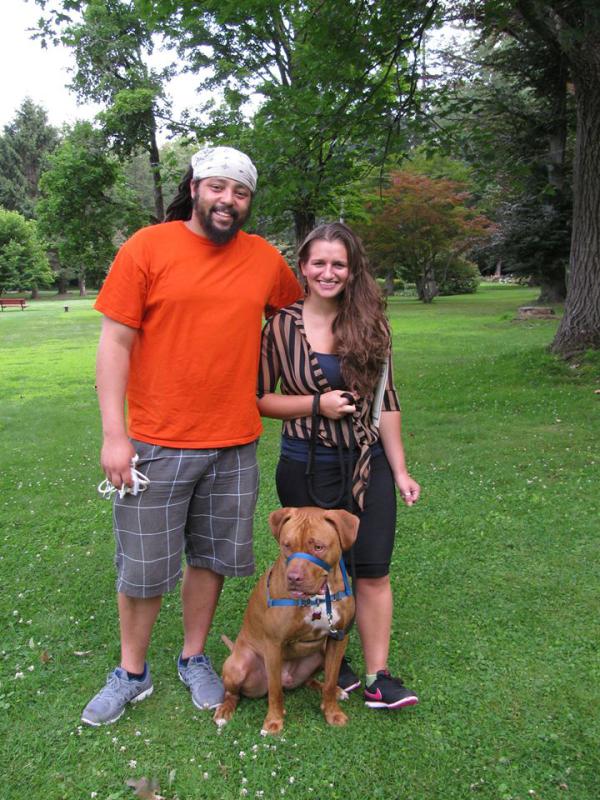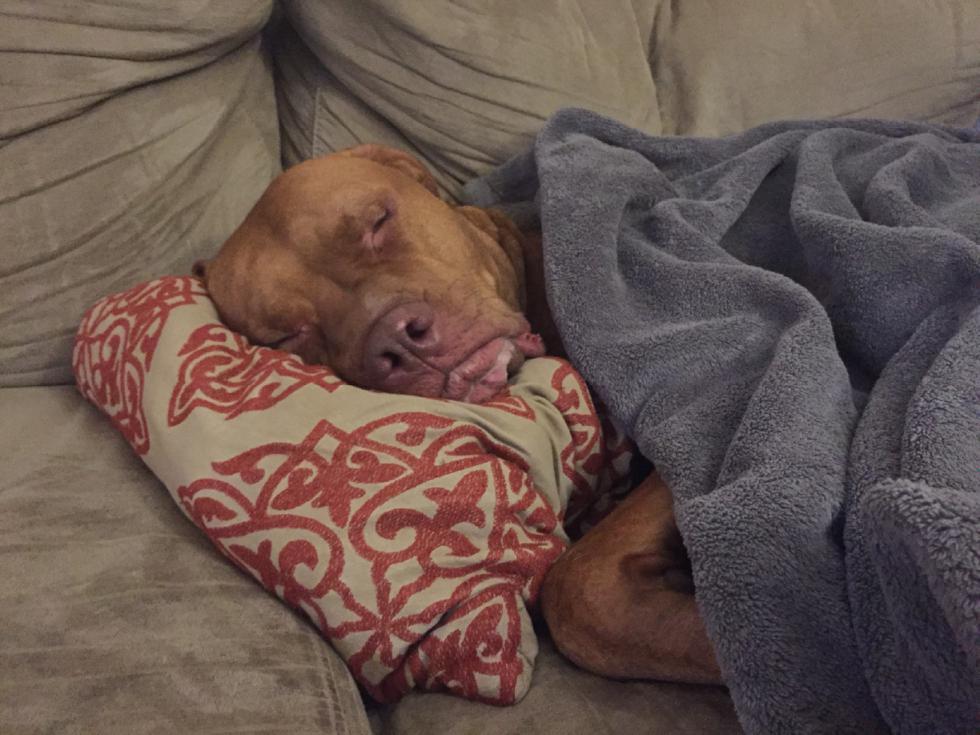I have a confession to make, people — I own a pit bull.
Phew! I’ve been hemming and hawing over whether or not to outright say that for weeks. Because the consequences are indeed scary. As a disclaimer: if anyone tries to take my dog-son away we’ll go on the run together.
I hesitate to tell you this because my dog — my wrinkly-faced baby who lets my nieces and nephews take toys out of his mouth no-problem and looks sadly on as my cat steals whole chunks of chicken out of his bowl and runs away with it — is considered a “dangerous” dog.
In my research for this week’s cover story, “Who Kicked the Dogs Out,” I found that pit bulls comprise the majority of our local shelter population. The insurance connection — the fact that so many owners of pit bulls see their homeowners’ insurance cancelled or their insurance premiums doubled when insurance companies discover they own pit bulls — is too strong to ignore.
While I’m sure there are some aggressive pit bulls out there — just as there are aggressive dogs of all breeds — it feels unjust that dogs as obedient and well-behaved as mine live in shelters or are euthanized due to lack of space simply because breed-specific policies keep would-be adopters from having them in their homes.
Probability is a tricky thing. The whole argument proponents of breed-specific laws make about pit bulls and other so-called dangerous breeds is that these dogs bite more people. There doesn’t seem to be any reliable statistics that prove that a pit bull is more likely to bite than a golden retriever. Dog fighting, irresponsible dog owners — owners that have exploited the breed’s eagerness to please and responsiveness to training to bring out violent behaviors, inattentive dog owners who don’t exercise or obedience-train their dogs — along with heavy overbreeding and oversized litters, make it difficult to obtain reliable statistics.
Pit bulls, like rottweilers, German shepherds, and others, are a protective breed. Like dogs of many breeds, they’ll bark when guests arrive, it’s just that we have more preconceived notions about these breeds doing it versus, say, a labradoodle. But the reality is all dogs are inclined to protect their territory because that’s why humans domesticated them in the first place.
As for my dog, his exuberance is difficult to contain, but there’s a harness for that. He’s protective of his house and there’s been a whole lot of training for that. He is an excellent dog. I’ve had dogs all my life — a retriever, an American bulldog, a rottweiler, several Alaskan malamutes — and all of them were great in different ways, but never have I had a dog so eager to please and therefore easy to train as my pit bull, Niko. Sorry to be a bragging dog-mom, but I have the training certificates to show he is a star student.
My boyfriend and I are young, we don’t have a lot of resources, and we were able to turn this alpha-male type pit bull into a good citizen. We landed with a fiery type that liked to prove his dominance with other dogs as an 8-week-old in puppy class, but thanks to the understanding and always-positive guidance offered by our trainers, he has a posse of doggy friends and can be introduced to any dog. That’s not to say we take him to the dog park anymore — too much chaos to handle introductions carefully — but we’ve never had a problem with him and other dogs.
He’s still a work in progress. He, like many dogs of all breeds, is leash reactive, meaning he’ll thrash wildly if we walk by another dog while on leash. Because he’s great off-leash, the experts say this is not aggression but rather the frustration of being held back. So please don’t be terrified when you see us out, dear reader. And no, the face harness is not a muzzle. It’s to ensure that in moments like these — when he pulls and thrashes — that I have complete control over his 90-pound body. Plus, the strap puts pressure on a point at the base of the snout that when pressed relieves tension.
Niko is the life of the party, really — he plays nicely with all the adult humans, little humans, and dogs. Work getting him there was 50-50. He loves people and he loves pleasing his owners, who continue to put in a whole lot of effort to ensure he is a breed ambassador. I don’t blame the insurance companies for their breed bias any more than I do that woman who sneers at my dog and removes herself from the sidewalk as Niko and I walk by. He’s a large, intimidating dog made scarier by a batch of bad dog owners and media stereotyping. Truth is he’s no more likely to “turn on me” than your chocolate lab is to you.
So let’s get rid of breed-specific policies and find the right homes for these dogs. Humans got pit bulls into this mess and now we should at the very least be open to helping them out of it.•
Contact Amanda Drane at adrane@valleyadvocate.com





